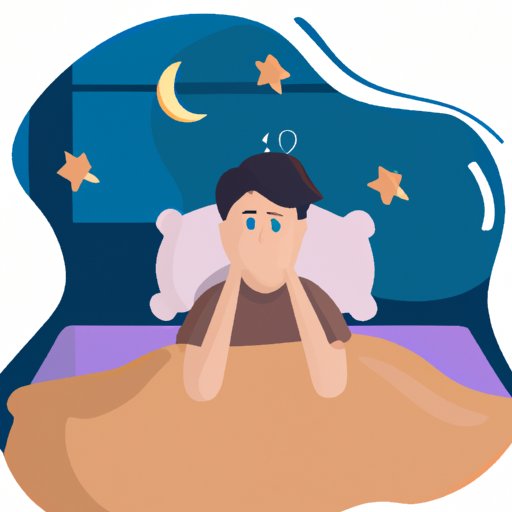
Introduction
Sleep deprivation occurs when we do not get enough sleep or sleep poorly regularly. It can lead to physical and mental consequences that impact our daily functioning. When we sleep, our body rests, and our brain processes information and prepares for the next day. When we do not get enough sleep, that balance is upset, leading to a variety of negative effects. This article will cover the science of sleep deprivation, the dangers of pulling an all-nighter, the mental health implications of sleep deprivation, recognizing signs of sleep deprivation, and strategies for staying awake for longer periods.
The Science of Sleep Deprivation: The Effects of Going Without Sleep for 24, 48, and 72 Hours
There are four stages of sleep, and each stage serves a specific purpose. During the first two stages, our body transitions from wakefulness to sleep. In stages three and four, our body is in deep sleep, and our brain sorts and processes information. When we do not get enough sleep, we miss out on these fundamental processes.
Sleep deprivation can lead to a variety of physical and mental consequences. The physical symptoms of sleep deprivation include fatigue, headaches, and decreased appetite. Mentally, individuals may experience mood swings, irritability, and difficulty with memory and concentration. Going without sleep for 24 hours can lead to hallucinations, and going without sleep for 48 hours can begin to impact your ability to make decisions. After 72 hours of no sleep, individuals experience cognitive impairment similar to that of being legally drunk.
The Dangers of Pulling an All-Nighter: Why Going Without Sleep is Never Worth it
Pulling an all-nighter to complete an assignment or finish a project may seem like a temporary solution, but the consequences are far-reaching and dangerous. Sleep deprivation can lead to poor decision-making abilities, slower reaction times, and increased risk-taking behavior. It can even increase the likelihood of experiencing a car accident or workplace injury. Drowsy driving is dangerous as a sleep-deprived driver can experience micro-sleeps, which can lead to accidents. On average, drowsy driving causes 100,000 accidents each year, resulting in 40,000 injuries and 1,550 deaths.
The Mental Health Implications of Sleep Deprivation: Understanding the Link Between Insomnia and Depression
Sleep is vital for mental health, and sleep deprivation can impact our emotions and mood. Without sufficient sleep, individuals are at higher risk for developing mental health disorders such as depression and anxiety. Sleep deprivation can lead to an imbalance of hormones that regulate mood and emotions. This can cause mood swings, irritability, and can contribute to the onset of depression. Studies have found that individuals with chronic insomnia had ten times the risk of developing depression compared to those who slept well.
How to Stay Awake for Longer Periods: Tips and Tricks for Night Shift Workers and Sleep-deprived Students
Night shift workers, students, and anyone experiencing sleep deprivation can benefit from developing a sleep routine. It is essential to plan sleep into your schedule, a bright, and quiet environment for sleep. When trying to stay awake for longer periods, consuming caffeine, drinking water, and getting exercise can help. Snacking on protein-rich foods like nuts and cheese can provide sustained energy. Additionally, taking breaks from studying or work, and sleeping or napping during the day when possible can also be beneficial.
Recognizing the Signs of Sleep Deprivation: What Happens to Your Body and Brain when You Don’t Get Enough Sleep
Chronic sleep deprivation is harmful as it can result in long-term health consequences. Individuals who routinely get too little sleep are at higher risk for developing cardiovascular disease, diabetes, and obesity. Furthermore, individuals with poor sleep habits can contribute to the onset of insomnia. Signs of sleep deprivation include difficulty falling asleep or staying asleep, unusual sleep patterns, irritability, mood swings, and difficulty concentrating. Recognizing these signs early on and addressing them with a sleep routine can help alleviate the issue.
Conclusion
Prioritizing sleep is crucial for our overall health and well-being. Sleep deprivation can impact our physical and mental health, our work performance, and our safety. Developing a sleep routine and consistently creating time to rest can lead to significant benefits to our daily lives. If you are experiencing chronic sleep deprivation, speak with your doctor, and address your sleeping habits. By paying attention to our sleep hygiene, individuals can ensure their bodies and minds get the rest they need to function optimally.





